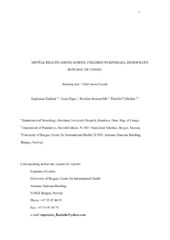Teacher ratings of mental health among school children in Kinshasa, Democratic Republic of Congo
Peer reviewed, Journal article
Accepted version

View/
Date
2005Metadata
Show full item recordCollections
Original version
https://doi.org/10.1007/s00787-005-0446-yAbstract
Introduction: In Africa, little is known about child mental health. This study piloted the Strengths and Difficulties Questionnaire (SDQ) in Kinshasa, investigated mental health problems and the association between these problems and school performance, demographic factors, illness and nutrition. Methods: An epidemiological survey was conducted with 1187 children, seven to nine years old, recruited from randomly selected schools. Mental health problems were assessed with the SDQ (a behavioural screening tool) administered to teachers. Stability of the factor structure was examined using principal component factor analysis of the SDQ items. The reliability was evaluated using measures of internal consistency of the SDQ scales. Results: Factor analysis yielded five factors, similar to the published SDQ scales. The internal consistency was satisfactory on all of the SDQ scales. Using the 90th percentile, the cut-off scores were somewhat higher from the published cut-off scores. Poor nutrition, low socioeconomic status and illness were found to increase the risk for mental health problems and low school performance. Conclusion: SDQ may be considered useful to describe mental health problems among urban African children in Kinshasa. An association between mental health, school performance, demographic factors, illness and nutrition was found.